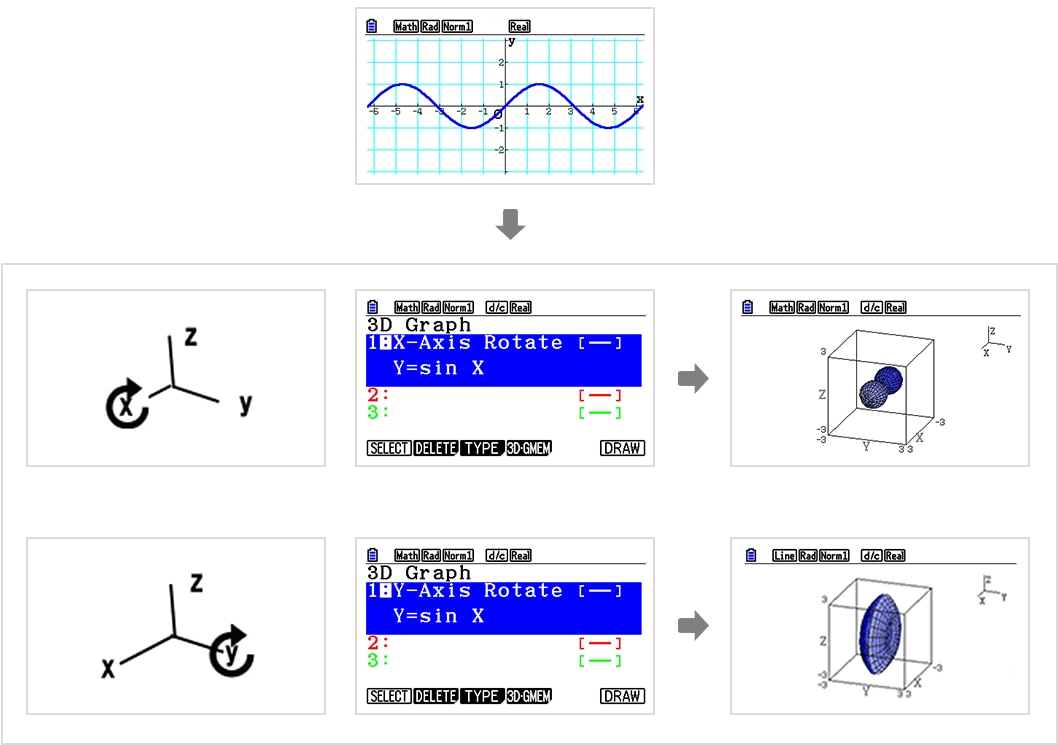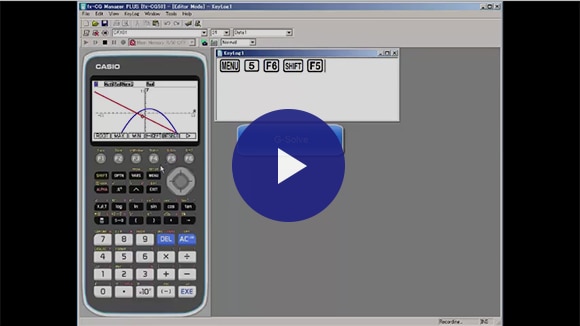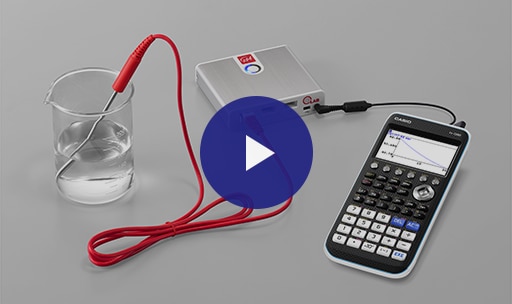
Graphing Scientific Calculator
fx-CG50
Easy-to-operate, high-definition 3D Graph provides visual support for mathematical exploration.
fx-CG50 has intuitive operability and exploring features, ideal for mathematics learning.
OS Update Information
Click here to check the latest OS
Features
1 Easy and Intuitive operability
Intuitive operability and G-Solve features make it easy to use the features of fx-CG50.
So you can spend less time teaching how to use graphing calculators (, and more time teaching mathematics).

Interactive format

G-Solve feature
1Intuitive operation
The user-friendly Icon menu, Function keys and Interactive format enable intuitive operation.

Icon menu

Function keys

Interactive format
Example
Solve the Polynomial equation.
x2 + 2x + 1 = 0The solution is
x = -1

Icon display

Interactive format

Input coefficient

Solution
2 Essential functions for learning all in one
Graphing calculators have a variety of functions covering from primary to higher education. Students can cultivate mathematical thinking through Graph functions operated by themselves.

3D Graph function
1Graphing function
Graph

Linear and Cubic function Graphs

Inequality Graph

Parametric Graph

Polar coordinate graph
3D Graph

CONE

Z=graph

Parametric graphs

Rotating body graphs
Learn mathematics more deeply using Explore feature
Students find answers in different ways.
For example, students can use either Graph, Equation, or Matrix function to solve the simultaneous equations below.
Example
Solve the simultaneous equations.
{ y = x y = -x + 2The solution is
x = 1
y = 1
1. Using Graph

Icon display

Input Equations

Draw Graphs

Intersection coordinates
2. Using Equation calculations

Icon display

Select equation

Input coefficient

Solution
3. Using Matrix calculations

Icon display

Input matrix A

Input matrix B

Matrix calculation
Learn 3D Graphs more deeply using Explore feature
It’s difficult to understand 3D graphs used in textbooks.
The 3D Graph feature of the fx-CG50 makes it easy to draw and explore 3D graphs. This feature promotes mathematical understanding of 3D graphs and helps in learning solid figures.
1. Draw and display 3D Graph
3D graphs can be drawn in various ways.
1) Using templates
It’s easy to draw 3D graphs using templates. (*An industry-first feature)
2) Z= graph
3) Parametric graphs
4) Rotating body graphs (① around X-Axis, ② around Y-Axis) *An industry-first feature
Rotating body graphs can be drawn in two ways (rotating around X-Axis or Y-Axis).


2. Draw and display up to three 3D graphs
Recognize combinations of 3D graphs and interactive relationships between two or three graphs mathematically.

Three expressions available

Cylinder and lane expressions

Three expressions available
3. Investigate the relationship between expressions and 3D graphs

Expression



3D Graph
Select EXPRESS, VECTOR, or POINTS format when inputting expressions of 3D graphs.

EXPRESS format

VECTOR format

POINTS format
4. Explore 3D graphs mathematically
These functions are effective in exploring 3D Graphs geometrically.
1) Viewing from various directions
①Zoom in and zoom out ②Rotation vertically and horizontally ③Cross section ④X-axis, Y-axis, Z-axis view.
These functions are effective in exploring 3D graphs geometrically.

Cylinder
①

Zoom in

Zoom out
③

Cross section
②

Vertical rotation

Horizontal rotation
④

X-axis view
Y-axis view
X-axis view
2) Tracing of graphs *An industry-first feature
Explore the coordinates on the surface of 3D graphs (all kinds) by using the cursor keys to move the trace pointer.
3) Intersection between graphs *An industry-first feature
Explore the intersection (coordinates, line) between 3D graphs (line and line, line and plane, plane and plane).
Expression of the intersection line or the coordinates of intersection
4) Relation between graphs *An industry-first feature
Explore the relationship (parallel, orthogonal, etc.) between 3D graphs (line and line, line and plane, plane and plane).
*Based on CASIO information as of August 2017
3D Graph Samples
1. Z= graph
2. Parametric graphs
3. Rotating body graphs
Example 1
Examine intersections between lines, planes and spheres.
Effective learning with 3D Graph
1. Draw and display 3D Graph
Students get the possibility to visualize the most important intersections between lines, planes and spheres: The intersection point, line or circle. This can be very helpful for them to develop solution strategies.
Additionally different input methods are used in all these examples.
Definition by vector, definition by equation.
Definition by vector, definition by equation.
Students can view graphs from various angles, and explore the intersection between 2 objects visually by themselves.
Example 2
Examine the relationship between lines and planes and their intersections.
Teachers and pupils can study the relationship between lines and planes and can examine their intersections.
Intersection : Intersection point, intersection line or Not Found, etc.
Relation : Intersection, Parallel, Orthogonal, or Skewed lines etc.
2Other functions
Scientific calculations
Basic function

Fractions, Square roots Exponents, Logarithms and Trigonometric functions
Algebra

Complex number calculations and Matrix calculations
Calculus

Differentiation calculations and Integration calculations

Statistics

Pie Chart

Med Box

Linear Regression

Normal Probability Distribution Graph
Geometry

Apollonius Circle

Three centers of Triangle

Triangle and circle
Programming language "Python"
The fx-CG50 comes built-in with Python, a programming language used in the development of Internet search engines, social media sites, robots, etc.
Learning algorithmic thinking with Python*
Python is attracting attention in the field of education as a learning tool that cultivates algorithmic thinking and has been adopted for use in textbooks.
*Python is a registered trademark of the Python Software Foundation.
Python mode supports a version of MicroPython Version 1.9.4, which has been adapted to run on this calculator. Please note that MicroPython is different from the Python that runs on a computer.

Reproduce textbook content on a calculator!
Example
Try to program in Python and explore by inserting various values.


By Python


Answer

3 Extensive and advanced features
Data-logger can be used with graphing calculators and is effective for both mathematics education and science and technology education.

Science and Technology Education
1E-CON4
1) This feature, with a simple user interface, is effective for collecting data for use in classroom science and technology lessons.
This feature has Auto-ID recognition, which enables automatic drawing of graphs of collected data with no complicated settings.
Effective for Science and Technology Education
2) Manual Sampling Mode
This feature includes Manual Sampling Mode, which enables you to freely draw graphs of collected data.
2Applied studying

Financial calculations

Periodic Table

Fundamental Physical Constants

Conversion
3Examination Mode
This mode allows you to quickly prepare your calculator for exams. This mode restricts access to memory, programs, functions and applications, so that these features would not be available during exams.
Effective for Examinations in school
Teacher's Voice

School
Math and Science Division Chair at Lyons Township High School
LaGrange Illinois (USA)
Name
Ismael Zamora
Comment
When I first saw the Casio fx-CG50 in action I was amazed by the color and the power at my fingertips. My students fell in love with the simplicity of its menu driven icons. They commented that it was like using a smartphone. As a teacher I look for technology that will support what I am doing in class and not complicate my lessons. The fx-CG50 replaced my need for complicated button pushing instructions and allowed me to focus on teaching mathematics at a deeper level. My lessons could focus on understanding the math behind the solution on the screen. I can explore mathematics like addition, geometry, statistics, probability, calculus, 3D graphing and beyond. The fx-CG50’s built in functions allow for use in science classes. Students can convert between units and use physics constants in calculations. There is even a built in high resolution periodic table of elements. It is the one essential tool in my S.T.E.M toolbox.



































































